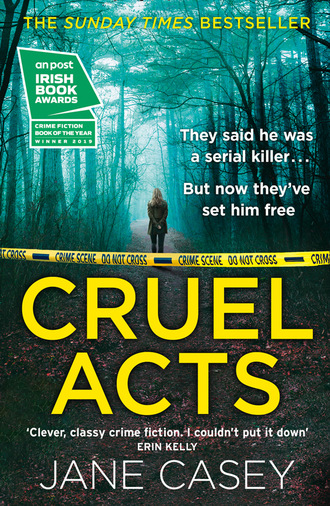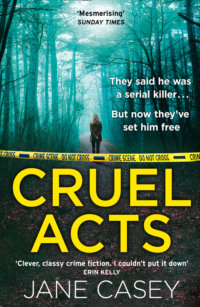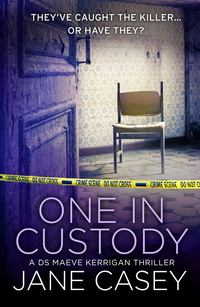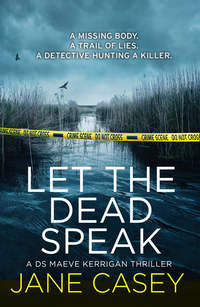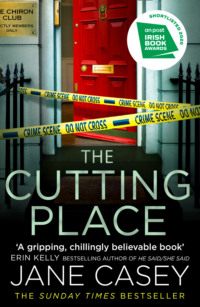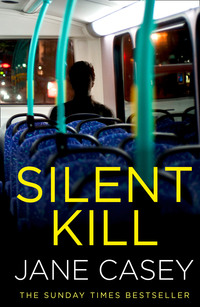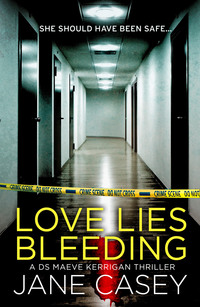‘Nope. I think every inch of it was searched, too. Whitlock didn’t want to miss something obvious.’
‘So what do you think about the blood?’
‘I think we should assume it was Rachel’s.’
‘Why?’
‘Because assuming it isn’t won’t get us any further and we haven’t identified any other women he might have attacked. Our best chance is to be positive about connecting Rachel Healy to Leo Stone and work to that end.’
‘This is a man who kills without spilling blood, though. The only blood we found from the other victims was a speck on some plastic. He’s incredibly disciplined about it. You’ve seen the pictures – the room was spotless. So you have to believe he took Rachel to his house and for some unknown reason killed her in a messy and uncontrolled way, and that he was sufficiently excited by that to go back and take another woman off the street nineteen days later.’
‘Maybe it went wrong.’
‘Maybe it was nothing to do with him,’ Derwent countered, and my throat tightened with irritation.
‘Well, the blood had to come from someone. Even if it wasn’t Rachel Healy, and I think it was, someone died violently in that room and bled through the floorboards. How does that fit in with your incredibly disciplined killer?’ My voice was a shade too loud and Derwent grinned.
‘Shh. You’ll scare the barman.’
‘He’s not listening.’ I leaned sideways to check, all the same. His girlfriend was still talking, although she had moved on to the tattoo she was planning to get and where it should go.
I took a grip on my temper and returned to Derwent. ‘If it wasn’t her blood, where did Rachel Healy go?’
‘Someone else killed her. A boyfriend. An ex. A stalker. I don’t know.’ Derwent tapped the beer mat against the edge of the table. ‘It’s more of a stretch to believe it was Stone than that someone else wanted her dead. Two women a week die at the hands of partners or ex-partners. Did we look at her boyfriends?’
‘I don’t know. I assume so – at least before Whitlock got involved. There was a whole month where nothing much happened on the investigation, remember.’
‘That won’t have helped.’
‘No. No one helped Rachel, alive or dead.’
Derwent leaned back, watching me with that close attention I slightly feared. ‘Don’t get hung up on her.’
‘What’s that supposed to mean?’
‘You need to keep some perspective on it. She’s been missing for years. Your chances of finding her at all are slim, let alone making a case that Leo Stone killed her. If she’s dead, it doesn’t matter to her.’
‘She has a family. Friends.’
‘And you can’t bring her back for them.’
I looked away instead of at his face. I didn’t want to admit that he was right, but I knew he was. The CD changed to piano music, cool notes drifting through the dusty air like snowflakes. The barman dropped the cloth he had been using to polish glasses and leaned across the counter, drawing his girlfriend’s face towards him so he could kiss her. She held on to his wrists and closed her eyes and I found I was holding my breath …
‘You’re quiet.’
I came back down to earth with a bump. It was just as well Derwent had his back to the bar because he would probably have heckled, or at the very least criticised the barman’s technique. ‘It’s this case. It looks solid from a distance but it all falls apart when you poke it.’
‘Don’t tell me you’re having doubts about Stone.’
I shook my head. ‘It’s too much of a coincidence to think his van was here and Willa’s blood was in his house by chance. But Miss Middleton never saw Leo Stone at the van. No one did. They didn’t trace a building company that was using him around here. According to him he’d been off work for a month because of back pain and Miss Middleton got the VRN wrong when she wrote it down.’
‘Back pain my arse. His van was here. He was hunting in this area. It’s perfect. No CCTV. No nosy neighbours. Plenty of footfall from the pubs, people coming home late. Easy access to main routes out of the city centre.’
‘That’s a good point. We’re not far from Euston and King’s Cross. The Euston Road is the A501 and if you stay on it and keep heading west, it turns into the Westway.’
‘See? It all fits. He was using that as his main route through the city and dropping off it anywhere that seemed quiet and residential. This is exactly the sort of place where no one is going to notice you hanging around. You heard what Miss Middleton said about the area. It’s a backwater between busy areas. It’s not unusual to have strangers passing through, or hanging around for a few days at a time. No one is going to look twice at a man in a white van unless they’re an elderly lady with nothing better to do.’ Derwent drained the last of the liquid in his glass and burped. ‘Come on. Back to the car. It’s time to go and talk to Dr Early about body dumps and decomp.’
‘I can hardly wait.’
8
Derwent breezed into Dr Early’s office. ‘Knock knock, Doc. What have we got?’
She looked up from her paperwork. The desk was, as usual, piled high with folders. Some of them had slid sideways, spilling their contents: forms, lab results, photographs … I had trained myself to look anywhere but at the pathologist’s desk. It was all right if you were prepared for what you might have to look at, but a glance could be scarring. Once seen, some horrors couldn’t be unseen. ‘Too much work and not enough hours in the day.’
‘Same,’ I said. ‘Is this a bad time?’
‘Not if you’re here to talk about Leo Stone.’ She stood up and with unerring confidence hooked a file out from the middle of the cascade of papers on her desk. There was a system to the chaos. ‘I’ve set things up in the meeting room next door.’
We followed her obediently, in my case wondering what she meant by things and suspecting I wasn’t going to like whatever it was. I was much too experienced now to be worried about fainting or vomiting at a grisly post-mortem, but I couldn’t claim to take every detail in my stride.
‘Here we are.’ The room was dim, the blinds closed. Dr Early tutted impatiently as she adjusted them, turning the slats so we could see the images on two large noticeboards that filled one end of the room. As light flooded in, the shadowy pictures leapt into focus. ‘I’ve done one side for Sara Grey and the other for Willa Howard. You wanted a quick catch-up, I take it?’
‘Ideally.’ Derwent’s attention was on the noticeboards. He strolled down to look closer, his hands in his pockets, but the way he stood – his absolute focus – told me he was concentrating on what was in front of him, and that he was by no means as casual about it as he pretended to be.
‘I’ve pulled this together from the files and the evidence that was presented at trial. I’m going to explain all of this to you as I would explain it to a jury, so if I use too much jargon, feel free to stop me and ask any questions you might have. Also, some of this isn’t my speciality. If you really want the details on this, you need a forensic entomologist.’
‘You’ll do for now,’ Derwent said, and Dr Early ran the end of her pen along a series of photographs that filled the top left corner of Sara Grey’s noticeboard.
‘This is the body where it was discovered in the nature reserve. It was actually the second one that was located, I believe, but she died first so I’m going to start with her.’
The photographs were taken from every possible angle and all showed the same thing: the skeletonised remains of a human being who had been left to disintegrate on open ground. The grass was trampled in front of the body but it had grown up to a height of four or five feet around her, and through her. There was something almost beautiful about the grass, the tiny wildflowers, the leaves and the bones, especially in the close-up images where it was possible to forget that these were the mortal remains of pretty, shy Sara Grey, whose face smiled back at me from the centre of her board.
‘I went and had a look at the dump sites to see if there was anything I needed to know about the locations – if they were especially wet, for instance, that would affect what we found.’ She pointed to a large sheet of paper that stretched between the two boards. It was covered with inscrutable marks and shapes. ‘This is my best artwork, so be kind.’
‘It’s lovely,’ Derwent said kindly. ‘What is it?’
‘A map of the site.’ She sounded a touch defensive. ‘I know it’s hard to follow but it makes sense to me. Sara was dumped here. She wasn’t dressed or wrapped in anything and no attempt was made to cover her or Willa.’ Dr Early indicated a roughly oblong squiggle on the map. ‘This is a rectangular building around a hundred metres away from where the body was left. It’s a bird-watching hide, which is significant because pedestrians aren’t allowed in this area of grassland’ – her pen traced a triangle in front of the hide – ‘in case it disturbs ground-nesting birds. The path runs on the other side of the building, here. It’s this line of dots.’
‘How accessible is the area?’ I asked.
‘The car park isn’t far away at all – a couple of hundred metres the other side of those trees.’ The trees were a row of asterisks that ran behind the grassland where the body had lain. ‘This nature reserve doesn’t have a permanent guard in residence. There’s nothing to steal, for one thing. There are gates and fences, but it’s not what you’d call secure. They also issue permits for night visitors from time to time, so no one would think it was strange to see a car or a van in the car park outside the usual opening hours.’
‘Do they keep a register of visitors?’ I asked, and Dr Early looked surprised.
‘I didn’t ask.’
‘Never mind, you’re doing well,’ Derwent said with a glower in my direction. She wasn’t a police officer, after all; I couldn’t expect her to think like one. ‘Keep going.’
‘The site he picked was far enough from the hide that no one there would notice any smells or unusual insect activity in this area – from a hundred metres away, you might see a larger number of flies than you’d expect or even a larger number of scavenging birds and butterflies and moths than would be typical for this area, but you wouldn’t connect any of those things with a corpse unless you were looking for one which, of course, we always are so for us it would be obvious but for your average layperson none of that would ring a bell.’ She ground to a halt, a little out of breath.
‘Right,’ Derwent said. ‘Of course.’
‘And the other thing about picking a reserve where there’s birdwatching is that they don’t allow …’ She looked from me to Derwent expectantly. I got it first.
‘Dogs.’
‘Exactly. It was a brilliant place to choose. No dogs allowed, so no dogs sniffing out the bodies until long after nature had done a huge amount of work in removing the soft tissue, the muscle, the skin. All we really have to go on are the bones at that stage, and bones are extremely useful but they don’t tell you the full story. For instance, if she had soft-tissue injuries, we’re not going to know what they were. The soft tissue goes with the first wave of insect activity – the blowflies and the greenbottles and the flesh flies. Female blowflies can sniff out a dead body within minutes. They don’t have strong mouthparts so they can’t tunnel into the body. They lay their eggs anywhere that’s easily accessible – injuries, eyes, mouths, nostrils—’
‘I get the picture,’ Derwent said quickly.
‘Right, right. It’s all so clever, that’s all. Nature tidying up after itself. The insects help decomposition along, and they do it in a way that’s completely predictable, which is particularly helpful for us.’ She clicked her pen. ‘But I’m getting ahead of myself. I was talking about injuries and how we can’t prove what killed Sara Grey.’
‘What? Not at all?’ Derwent sounded disconcerted.
‘We can’t prove it. We can suggest certain things, and rule other things out. Like, for instance, there’s the fact that Dr Hanshaw didn’t find any broken bones when he examined her. We didn’t recover all the bones, but that’s not unusual in a case where a body has been left in the open. Being buried tends to hold things together a lot more.’
My eyes flicked to the images of Sara Grey’s skull pillowed in the grass. ‘Aren’t those skull fractures?’
Dr Early’s eyes gleamed. ‘I was hoping one of you would notice. Yes, look at this image of the head. You can see quite clearly that there has been significant damage to her skull.’
The head was tipped back, the neck at an awkward angle, the chin pointing to the sky. Leathery remnants of muscle and skin coated the bone in places but I could see missing teeth and a couple of wavy cracks that ran from the eye socket up towards the crown of the head.
‘Here’s a better image of the top of her head – see the way the fractures waver across the bone?’
We nodded.
‘That’s a sign that she was already dead when the injuries happened. A post-mortem fracture has these crumbly edges – it’s like snapping a biscuit in two. You won’t get a clean line. If you’re alive, the break will be straight because the bone has more give in it. Think of snapping a piece of chocolate. You get a straight edge.’
‘I’d rather not think about food in this context,’ Derwent said. ‘If you don’t mind.’
‘Really?’ Dr Early looked surprised. ‘I always think the biscuit and chocolate analogy works for juries. Everyone can visualise it.’
‘It’s very helpful,’ I said and she beamed.
‘The other thing is the colour of the break. See how it’s lighter than the rest of the bone? Definitely post-mortem. What I can’t tell you is how she acquired the injuries. It could have been accidental. Dead bodies are really hard to manipulate – dead weight is a bugger to move around, no matter how strong you are or how small the victim is. So he could have dropped her a few times or whacked her into a doorway without meaning to hurt her.’
‘When he was finished with her he didn’t care any more,’ I said, and something in my voice made Derwent turn to look at me with a raised eyebrow. Dr Early didn’t seem to notice.
‘Probably not. She became a problem. Something to be dumped, not cherished.’
‘Cherished is an odd word to use. He killed her,’ Derwent said.
‘Mm, but how he killed her is the point. No nicks or marks on the bones, so almost certainly not stabbing – she had no defence wounds on the bones we recovered from her hands and arms either. Her hyoid bone is intact, which strongly suggests she wasn’t strangled. I think she was asphyxiated. It doesn’t take long to starve the brain of oxygen and achieve loss of consciousness so she would have had minimal opportunity to fight back and harm herself. I think he smothered her not long after he kidnapped her.’
The muscle was flickering in Derwent’s jaw. ‘Where’s the fun in that?’
‘That’s not a question I can answer,’ Dr Early said seriously. ‘But I think it’s worth looking at Willa Howard in more detail.’
I had been strenuously avoiding looking at Willa Howard in any detail at all. There was something more unsettling about the images of her, probably because she was more recognisably herself than her sister in death. The flesh had melted away from her body but there was still skin on her bones, and much of her hair had survived, spread out around her in straw-like profusion. She was lying on her front with her head turned to one side, her hands by her sides, palm up.
‘Willa was over here.’ Dr Early pointed to another squiggle on the map, further away from the hide. ‘When you visit the site you’ll see why she was found first – the body was in the lee of a fallen tree. A visitor to the site decided the tree would make a great vantage point for a picture, even though it was off the path. He stumbled over her.’
‘Jesus,’ Derwent muttered.
‘It must have been quite a shock,’ Dr Early agreed. ‘Luckily for him she was quite advanced in decomposition. The worst part – from the point of view of smell and maggots and so forth – is between four and twenty days after death. The gases build up inside the body. Once the abdominal wall is breached the body deflates and starts to dry out and most of the insect activity is from beetles, mites – that kind of thing. She was well into this stage when she was found in the first week of December, which was some five weeks after she disappeared.’
‘So you think she was killed straight away as well.’
‘It seems possible. But unlike Sara, she did have some injuries we can see. This is an X-ray of her skull – see the missing tooth at the front, here? That was broken off around the time of her death. The root is still there.’
‘Sara was missing teeth too,’ I pointed out.
‘Yes, but we recovered them. They became dislodged from the jaw after the gum deteriorated, once there was nothing holding them in place. Willa’s was snapped off and we didn’t find the tooth.’
‘It doesn’t rule out asphyxiation, does it?’
‘Not at all. We don’t know what method he employed but he may have needed to use more force on Willa. She was a little taller and heavier than Sara.’
‘And she was angry. She’d been drinking and arguing with her boyfriend.’ I could imagine her, her body humming with adrenalin and fear, lashing out at Leo Stone because how dare he attack her …
‘There was the blood on the plastic in the cupboard,’ Derwent said. ‘That had to come from somewhere.’
‘Probably this injury, or a nosebleed. Something like that. Unfortunately we did lose a certain amount of detail to decomposition before she was found.’ Dr Early peered at the X-ray as if it would reveal something new to her. ‘There are three things, really, that I wanted to draw to your attention. One: Dr Hanshaw also concluded that the women were asphyxiated and there’s nothing to contradict his assertion. As I said, without being able to see the physical manifestations of asphyxia – the pinpoint haemorrhages and so forth – it’s a case of excluding other modes of death. We are left with asphyxia as the most likely method of murder, as it’s relatively non-violent.’
‘Unless he poisoned them,’ Derwent said.
‘I know you’re joking but we did test for poisons. We tested their bone marrow and their hair, and it’s the hair that’s the second thing I want to talk about.’
‘What about it?’
‘Look at the condition of Willa Howard’s hair compared to how it was in life.’
‘Being dead isn’t great for your looks, as I understand it,’ Derwent said.
‘No, but it doesn’t change the consistency of your hair so quickly,’ Dr Early countered.
Willa’s hair had been long, smooth and thick. Every witness in the bar had commented on it. I frowned at the dry, frizzed-out thatch that covered her scalp. It was orange-tinged and it had snapped off in several places, leaving the ends uneven. ‘It looks as if it was bleached.’
‘That’s exactly what happened. She was soaked in bleach. I’d guess her entire body was immersed in bleach at least once if not more.’
‘To eradicate evidence?’
‘Maybe. Or to try to slow decomposition. The third thing about these bodies is the most interesting, at least to me. The women seem to have died relatively quickly after they were kidnapped, but they weren’t dumped in the nature reserve for a significant period of time after their deaths.’
‘How significant are we talking?’ Derwent asked.
‘Weeks. Maybe more in the case of Sara Grey. And I know that because of the insect activity I mentioned earlier. Dr Hanshaw got a forensic entomologist to sample insect life from the bodies and from the area around the bodies. It’s a reliable way of calculating how long the corpses had been there and what condition they were in when they arrived. What she found was a very small number of the insect first responders – the blowflies, the greenbottles, the flesh flies and so forth. There were plenty of beetles and mites who target fly larvae though – every decaying corpse is also an insect crime scene, I always say – so they had been present at one time, but the larvae hadn’t matured through their three stages to burrow into the ground and become pupae – or if they had, it was somewhere else and they were left behind when the bodies were moved.’
‘What does that mean?’ Derwent asked.
‘It means he kept the bodies until they weren’t usable any more,’ I said.
‘That’s my interpretation.’ Dr Early looked from me to Derwent, eyes bright. ‘The trouble with necrophilia is that it’s so messy.’
I shuddered. ‘Doesn’t bear thinking about.’
‘Toughen up, Kerrigan,’ Derwent snapped. ‘You do need to think about it, because we need to work out where he kept the bodies between the cupboard in his house and when he dumped them here. Not in Dagenham – there wasn’t a trace of post-mortem body fluids from either Willa Howard or Sara Grey, and from what you’re saying, Doc, there would have been a lot.’
‘Absolutely. The body’s own enzymes begin to liquefy the internal organs even without the help of insects. You can slow the process by keeping a body cold, but unless you find some way of mummifying them, you’re going to find they deteriorate.’
‘And there’s no evidence he tried to do that,’ I checked.
‘None at all. Unfortunately there isn’t much evidence of what he did, either. By keeping them until they had completed putrefaction he reduced the chances of anyone literally sniffing them out at the dump sites and he destroyed a lot of the forensic evidence we might have recovered otherwise.’
‘It was all so well planned, wasn’t it?’ I said. ‘We only found Willa Howard by chance, and that led us to Sara Grey. Leo Stone doesn’t strike me as a particularly deep thinker but he managed to kidnap women, keep them for as long as he liked, move them without being spotted and then dispose of them effectively.’
‘He’s spent years in prison. He probably spent the whole time planning what he was going to do when he got out.’ Derwent’s mouth twitched. ‘He had all the luck until he got arrested. You’ve got to think it’s our turn to be lucky now.’
9
Of course, luck wasn’t with us the next day either. The judges’ decision was a foregone conclusion, and everyone knew it, but the tension in the air was as thick as the mist that pressed against the small high windows. The lights were on, the old pearly shades casting a soft glow that fell on the walls of law books, the high wooden bench where three judges sat, sombre in their full wigs and gowns, and on their clerk who was busy with paperwork, his pen racing across the page. It fell on the attentive barristers at their desks in front of the packed benches of the public gallery. It fell on the tiny dock with its over-arching iron bars that separated the prisoner from the rest of us who sat in the courtroom. We were free and he was not.
Not yet.
I sat in the last row of the public benches. Despite its importance, the Court of Appeal was held in a small room, and it was packed. The court reporters were choosy about which cases they covered but this one was a guaranteed front-page splash. A murderer was always news. A murderer of women was even better, especially if the women were beautiful, especially if they had everything to live for, especially if they met a horrible end at the hands of a perverted stranger. But best of all was a gruesome series of murders combined with a miscarriage of justice. That was a story that had everything.
I looked at the man in the dock. Leo Stone, the man who had been haunting my thoughts, a nightmare made flesh. His eyes were closed, his face pale and impassive, his hair dark and greased back from a low forehead. He was tall but gaunt; his skin fell in loose folds from his prominent cheekbones and sagged from his jawline. Often, prisoners didn’t come to the Court of Appeal. It was quicker and cheaper to make them attend by video link, but on this occasion, I could understand why he had wanted to be present. I knew better than to think murderers always looked like what they were but something about Stone’s physical presence chilled me. The words and images from the files I’d read battered the inside of my skull along with a single word: evil.


